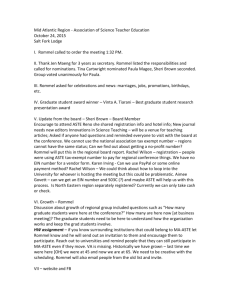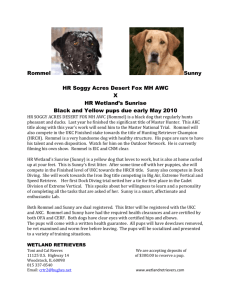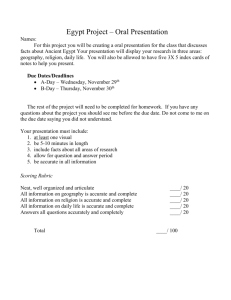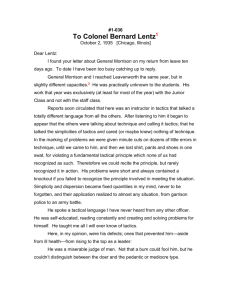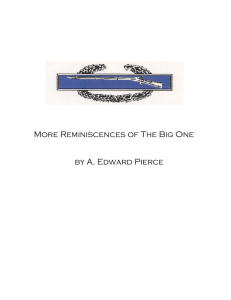3-241 - George C. Marshall Foundation
advertisement
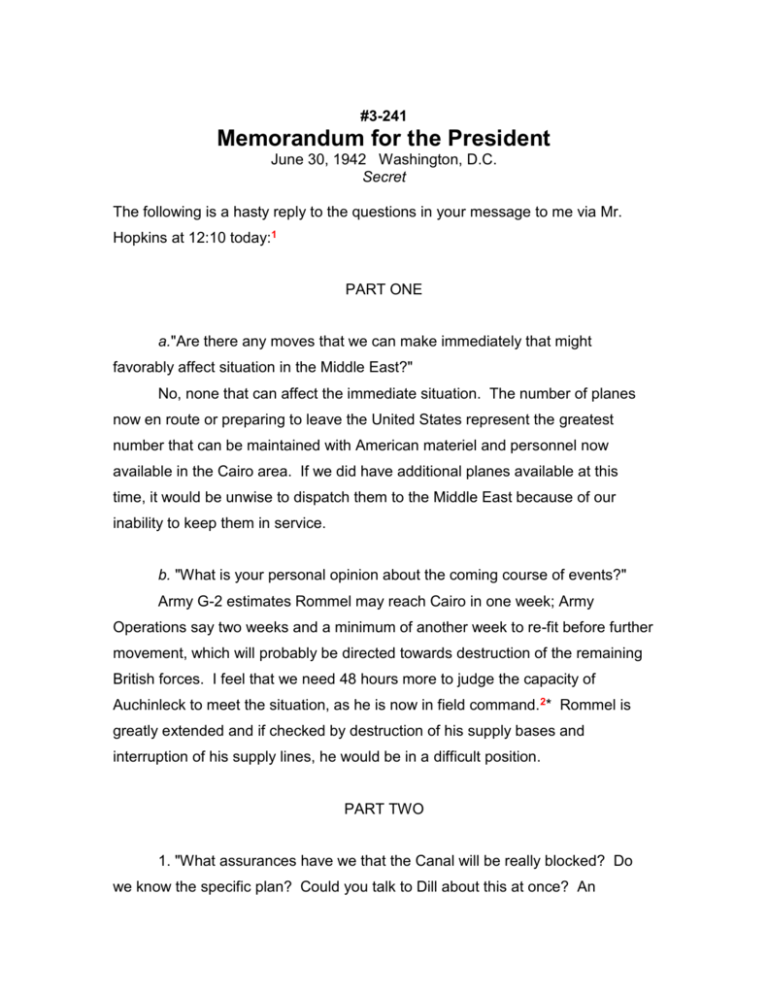
#3-241 Memorandum for the President June 30, 1942 Washington, D.C. Secret The following is a hasty reply to the questions in your message to me via Mr. Hopkins at 12:10 today:1 PART ONE a."Are there any moves that we can make immediately that might favorably affect situation in the Middle East?" No, none that can affect the immediate situation. The number of planes now en route or preparing to leave the United States represent the greatest number that can be maintained with American materiel and personnel now available in the Cairo area. If we did have additional planes available at this time, it would be unwise to dispatch them to the Middle East because of our inability to keep them in service. b. "What is your personal opinion about the coming course of events?" Army G-2 estimates Rommel may reach Cairo in one week; Army Operations say two weeks and a minimum of another week to re-fit before further movement, which will probably be directed towards destruction of the remaining British forces. I feel that we need 48 hours more to judge the capacity of Auchinleck to meet the situation, as he is now in field command.2* Rommel is greatly extended and if checked by destruction of his supply bases and interruption of his supply lines, he would be in a difficult position. PART TWO 1. "What assurances have we that the Canal will be really blocked? Do we know the specific plan? Could you talk to Dill about this at once? An effective block of the Canal is essential." The British have plans to block the Suez Canal at the point of passage through two rocky sections, presumably by blasting. Sir John Dill estimates that six months would be required to reopen the Canal. 2. "From what point or points would the British operate from Africa by air, land and sea?" By air, from the upper Nile region. By land, probably a divided withdrawal, the bulk going south if Rommel does not cut them off, as now appears possible; the remainder to the Northeast to join the British forces there for the purpose of protecting the Mosul oil fields and Basra. The transfer and the supply of these forces would be very difficult. By sea, from Massawa, Mombasa, Durban and Diego Suarez. "Also from what point or points in Asia Minor?" From Asia Minor points: by air operating from Palestine area; by ground as indicated above; by sea from Aden and Colombo. 3. "What would Rommel's or Germany's next move be? Do you think it would be Cyprus and Syria? Is the objective the Mosul oil fields?" The primary objective is destruction of the British Army; next the occupation of Cyprus and Syria; and eventually the seizure of the Mosul and Basra area. Action will probably also be taken to cut our air ferry route. 4. "What British forces could be moved to these areas and what would be the probable strategic defense of the oil fields?" British troops now at sea en route to the Middle East, one armored division, one infantry division. The number of troops that can be evacuated from Egypt will depend entirely upon the rapidity and success of Rommel's movement. Rail lines to the northeast and shipping in the Red Sea are dangerously exposed to interruption by air attack. Movement south through Egypt will necessarily be slow. There are now in Syria and Palestine one Australian division, one armored car regiment and one infantry brigade group; also 15,000 native Syrians, 8,000 free Greeks, 5,000 Poles, all with limited equipment, and approximately 40,000 Poles in uniform with almost no equipment. In Iran and Irak, there are one and possibly two Indian infantry divisions, one Indian armored division (partially equipped); in Cyprus, one infantry brigade group, two armored regiments, one armored car regiment, and two anti-aircraft regiments. The probable strategic defense of the oil fields would initially be to hold Palestine and Syria, but this would depend upon success of Russian defense in the North. 5. "Will you give me your judgment on kind of air and land force in Syria that would tend to hold Turkey in line?" To defend Syria and hold Turkey in line would require a sufficient force to defeat Rommel, approximately four armored divisions, two motorized divisions, and three infantry divisions, with about ten air groups. An open Mediterranean would permit very heavy reinforcements to Rommel, which eventually could be employed in this area, and this would necessitate an ever increasing expansion of the forces listed above—an expansion far beyond our capacity. 6. "What consideration should be given to strong defense of Basra or Black Sea area?" Defense of the Black Sea area will necessarily depend on the Russians. The Basra area is of great importance. Its port facilities are limited. Further, the sea lines of communication to Basra are long and vulnerable, presenting an impracticable proposition for major military operations against strong enemy movement out of the Mediterranean. The forces that may be assembled in this area immediately from Egypt and now en route to Egypt can fight a defensive and a delaying action over a considerable period of time provided (1) the Russian front does not collapse; and (2) all existing facilities and equipment in the Basra area are used. This would mean that Russian supply through this port would stop. A major effort in this region would bleed us white. G. C. Marshall *The British tell me A now has 300 tanks in operation.3 Document Copy Text Source: Harry L. Hopkins Papers, Franklin D. Roosevelt Library, Hyde Park, New York. Document Format: Typed memorandum signed. 1. The message, drafted by Roosevelt and Hopkins, requested a report on the situation in Egypt, asking what could be expected if the Germans controlled the Nile delta within ten days. (Roosevelt to Marshall, June 30, 1942, NA/RG 165 [OPD, 381 Middle East]; Sherwood, Roosevelt and Hopkins, pp. 595–98.) 2. On June 25 General Sir Claude Auchinleck, British Army commander in chief in the Mediterranean and Middle East, decided that his Eighth Army was in such a critical position and that the danger to Egypt was so great that he needed to take personal command of the field forces. (Playfair, Mediterranean and Middle East, 3: 285.) 3. General Marshall added this note by hand. Recommended Citation: The Papers of George Catlett Marshall, ed. Larry I. Bland and Sharon Ritenour Stevens (Lexington, Va.: The George C. Marshall Foundation, 1981– ). Electronic version based on The Papers of George Catlett Marshall, vol. 3, “The Right Man for the Job,” December 7, 1941-May 31, 1943 (Baltimore and London: The Johns Hopkins University Press, 1991), pp. 258–260.


